Impact of COVID-19 on the Hospitality, Leisure & Travel Industries
VerifiedAdded on 2023/06/14
|7
|1877
|57
Report
AI Summary
This report examines the significant impact of the COVID-19 pandemic on the Hospitality, Leisure, and Travel industries, detailing the challenges, adaptations, and potential recovery strategies employed by businesses within these sectors. It highlights the initial economic and societal disruptions, including decreased profitability, sales, and market share, alongside the shift to remote work and workforce reductions. The report specifically addresses the uneven effects across different sub-sectors, such as the decline in pubs, hotels, and traditional leisure activities, contrasted with the rise in domestic tourism and camping. It further explores the industry's response to the pandemic, including enhanced hygiene standards, increased environmental awareness, and the adoption of technology. The report concludes with recommendations for hotels, emphasizing the need for technology integration, improved online presence, contactless services, and a focus on food safety and hygiene to regain customer trust and adapt to changing consumer preferences. The report also underscores the importance of social media marketing and innovative solutions to navigate the post-pandemic business landscape.
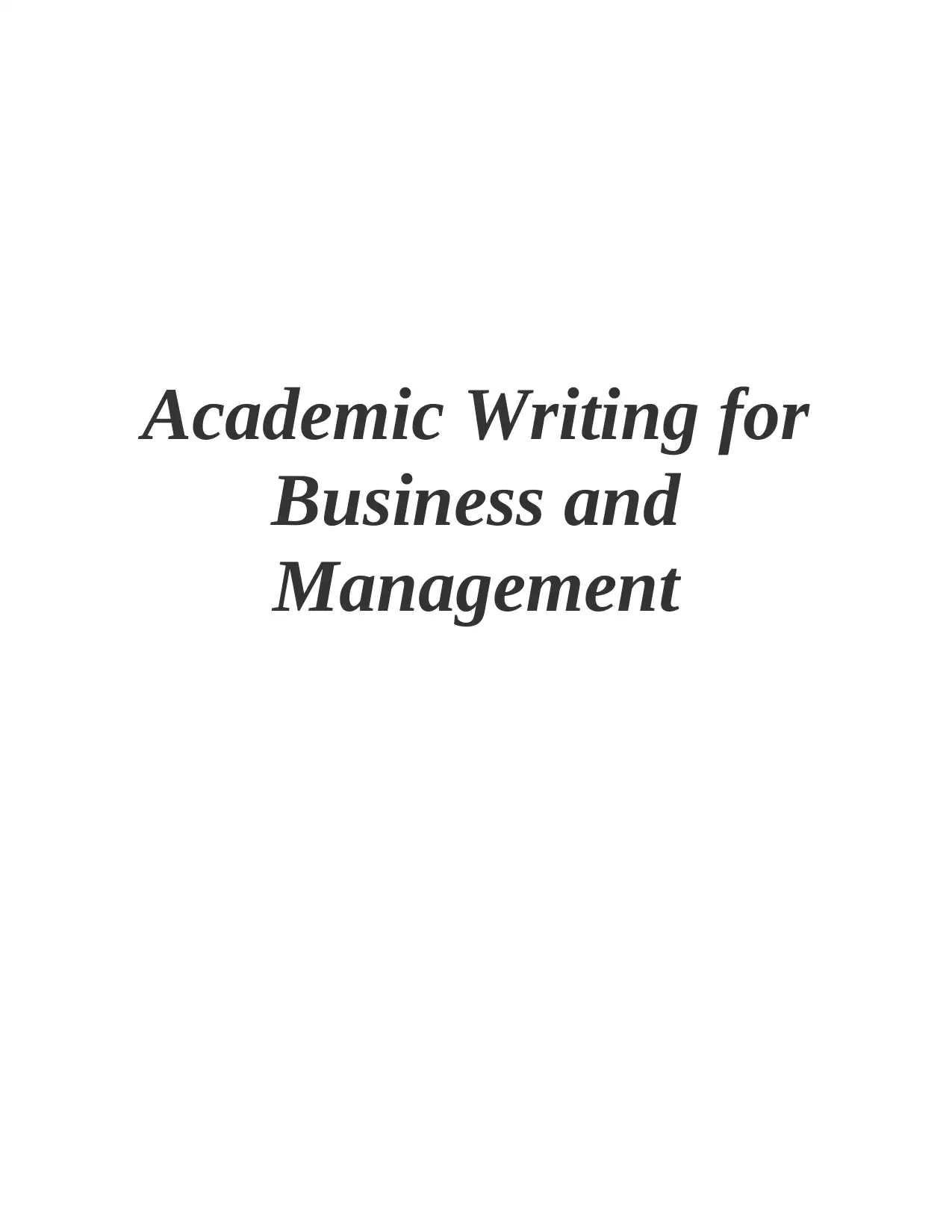
Academic Writing for
Business and
Management
Business and
Management
Paraphrase This Document
Need a fresh take? Get an instant paraphrase of this document with our AI Paraphraser
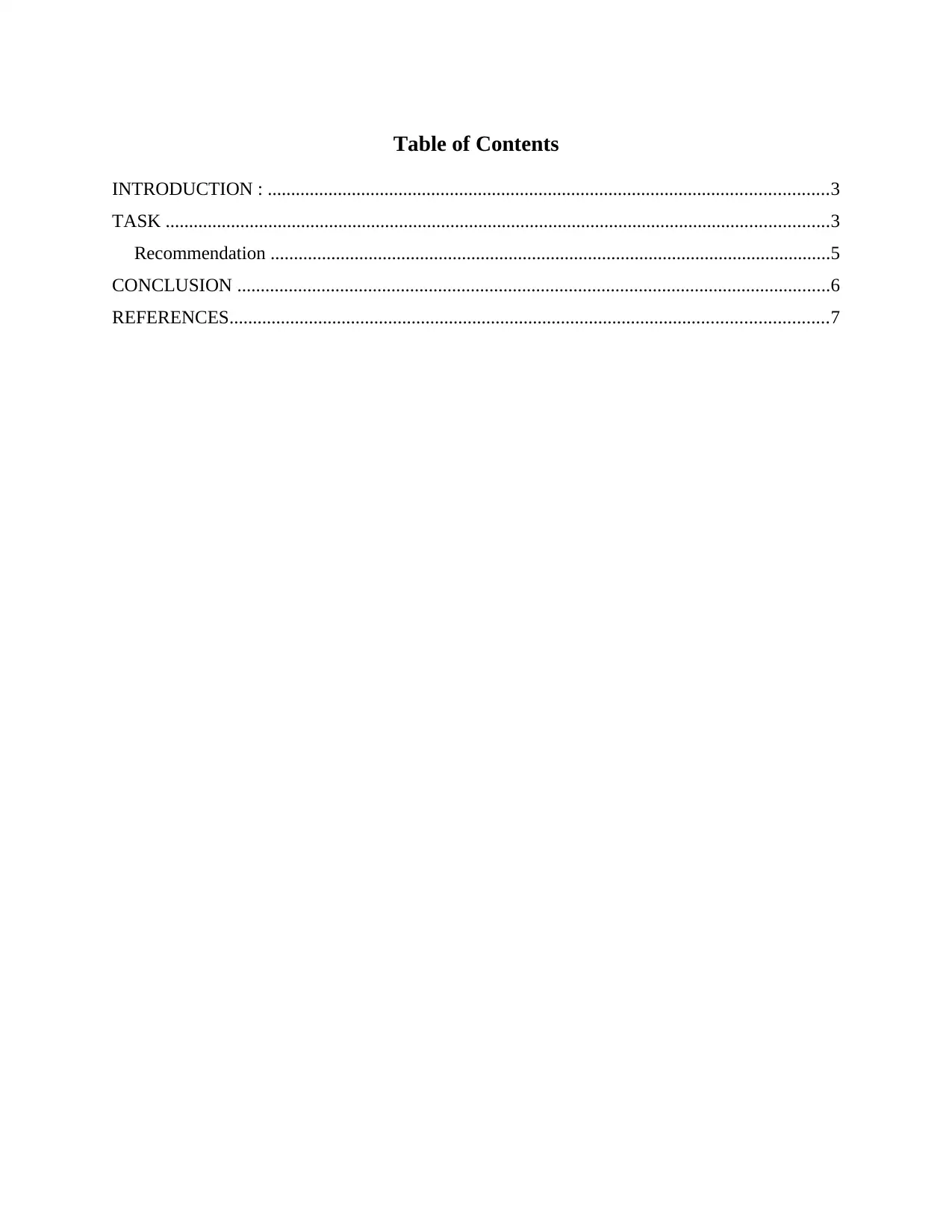
Table of Contents
INTRODUCTION : ........................................................................................................................3
TASK ..............................................................................................................................................3
Recommendation ........................................................................................................................5
CONCLUSION ...............................................................................................................................6
REFERENCES................................................................................................................................7
INTRODUCTION : ........................................................................................................................3
TASK ..............................................................................................................................................3
Recommendation ........................................................................................................................5
CONCLUSION ...............................................................................................................................6
REFERENCES................................................................................................................................7
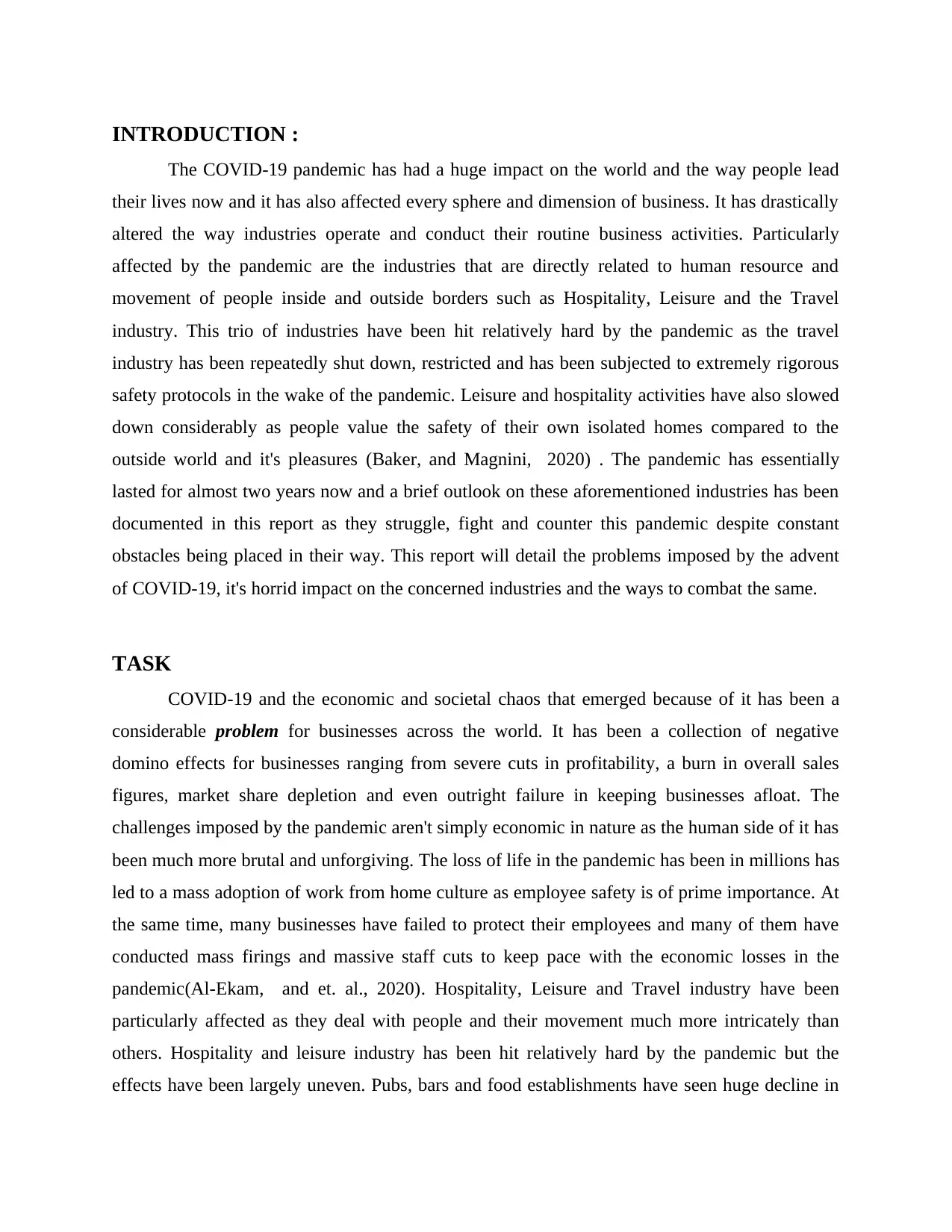
INTRODUCTION :
The COVID-19 pandemic has had a huge impact on the world and the way people lead
their lives now and it has also affected every sphere and dimension of business. It has drastically
altered the way industries operate and conduct their routine business activities. Particularly
affected by the pandemic are the industries that are directly related to human resource and
movement of people inside and outside borders such as Hospitality, Leisure and the Travel
industry. This trio of industries have been hit relatively hard by the pandemic as the travel
industry has been repeatedly shut down, restricted and has been subjected to extremely rigorous
safety protocols in the wake of the pandemic. Leisure and hospitality activities have also slowed
down considerably as people value the safety of their own isolated homes compared to the
outside world and it's pleasures (Baker, and Magnini, 2020) . The pandemic has essentially
lasted for almost two years now and a brief outlook on these aforementioned industries has been
documented in this report as they struggle, fight and counter this pandemic despite constant
obstacles being placed in their way. This report will detail the problems imposed by the advent
of COVID-19, it's horrid impact on the concerned industries and the ways to combat the same.
TASK
COVID-19 and the economic and societal chaos that emerged because of it has been a
considerable problem for businesses across the world. It has been a collection of negative
domino effects for businesses ranging from severe cuts in profitability, a burn in overall sales
figures, market share depletion and even outright failure in keeping businesses afloat. The
challenges imposed by the pandemic aren't simply economic in nature as the human side of it has
been much more brutal and unforgiving. The loss of life in the pandemic has been in millions has
led to a mass adoption of work from home culture as employee safety is of prime importance. At
the same time, many businesses have failed to protect their employees and many of them have
conducted mass firings and massive staff cuts to keep pace with the economic losses in the
pandemic(Al-Ekam, and et. al., 2020). Hospitality, Leisure and Travel industry have been
particularly affected as they deal with people and their movement much more intricately than
others. Hospitality and leisure industry has been hit relatively hard by the pandemic but the
effects have been largely uneven. Pubs, bars and food establishments have seen huge decline in
The COVID-19 pandemic has had a huge impact on the world and the way people lead
their lives now and it has also affected every sphere and dimension of business. It has drastically
altered the way industries operate and conduct their routine business activities. Particularly
affected by the pandemic are the industries that are directly related to human resource and
movement of people inside and outside borders such as Hospitality, Leisure and the Travel
industry. This trio of industries have been hit relatively hard by the pandemic as the travel
industry has been repeatedly shut down, restricted and has been subjected to extremely rigorous
safety protocols in the wake of the pandemic. Leisure and hospitality activities have also slowed
down considerably as people value the safety of their own isolated homes compared to the
outside world and it's pleasures (Baker, and Magnini, 2020) . The pandemic has essentially
lasted for almost two years now and a brief outlook on these aforementioned industries has been
documented in this report as they struggle, fight and counter this pandemic despite constant
obstacles being placed in their way. This report will detail the problems imposed by the advent
of COVID-19, it's horrid impact on the concerned industries and the ways to combat the same.
TASK
COVID-19 and the economic and societal chaos that emerged because of it has been a
considerable problem for businesses across the world. It has been a collection of negative
domino effects for businesses ranging from severe cuts in profitability, a burn in overall sales
figures, market share depletion and even outright failure in keeping businesses afloat. The
challenges imposed by the pandemic aren't simply economic in nature as the human side of it has
been much more brutal and unforgiving. The loss of life in the pandemic has been in millions has
led to a mass adoption of work from home culture as employee safety is of prime importance. At
the same time, many businesses have failed to protect their employees and many of them have
conducted mass firings and massive staff cuts to keep pace with the economic losses in the
pandemic(Al-Ekam, and et. al., 2020). Hospitality, Leisure and Travel industry have been
particularly affected as they deal with people and their movement much more intricately than
others. Hospitality and leisure industry has been hit relatively hard by the pandemic but the
effects have been largely uneven. Pubs, bars and food establishments have seen huge decline in
⊘ This is a preview!⊘
Do you want full access?
Subscribe today to unlock all pages.

Trusted by 1+ million students worldwide
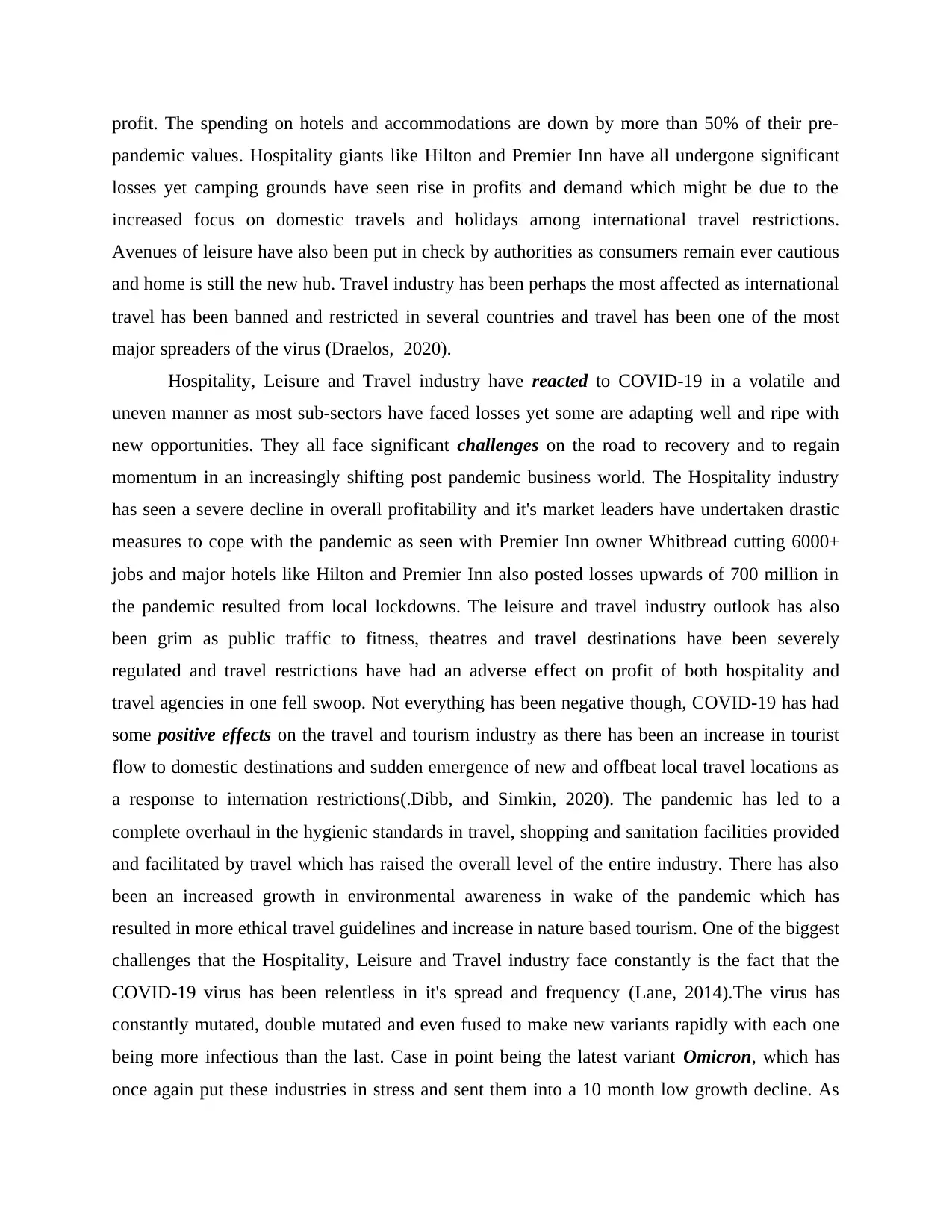
profit. The spending on hotels and accommodations are down by more than 50% of their pre-
pandemic values. Hospitality giants like Hilton and Premier Inn have all undergone significant
losses yet camping grounds have seen rise in profits and demand which might be due to the
increased focus on domestic travels and holidays among international travel restrictions.
Avenues of leisure have also been put in check by authorities as consumers remain ever cautious
and home is still the new hub. Travel industry has been perhaps the most affected as international
travel has been banned and restricted in several countries and travel has been one of the most
major spreaders of the virus (Draelos, 2020).
Hospitality, Leisure and Travel industry have reacted to COVID-19 in a volatile and
uneven manner as most sub-sectors have faced losses yet some are adapting well and ripe with
new opportunities. They all face significant challenges on the road to recovery and to regain
momentum in an increasingly shifting post pandemic business world. The Hospitality industry
has seen a severe decline in overall profitability and it's market leaders have undertaken drastic
measures to cope with the pandemic as seen with Premier Inn owner Whitbread cutting 6000+
jobs and major hotels like Hilton and Premier Inn also posted losses upwards of 700 million in
the pandemic resulted from local lockdowns. The leisure and travel industry outlook has also
been grim as public traffic to fitness, theatres and travel destinations have been severely
regulated and travel restrictions have had an adverse effect on profit of both hospitality and
travel agencies in one fell swoop. Not everything has been negative though, COVID-19 has had
some positive effects on the travel and tourism industry as there has been an increase in tourist
flow to domestic destinations and sudden emergence of new and offbeat local travel locations as
a response to internation restrictions(.Dibb, and Simkin, 2020). The pandemic has led to a
complete overhaul in the hygienic standards in travel, shopping and sanitation facilities provided
and facilitated by travel which has raised the overall level of the entire industry. There has also
been an increased growth in environmental awareness in wake of the pandemic which has
resulted in more ethical travel guidelines and increase in nature based tourism. One of the biggest
challenges that the Hospitality, Leisure and Travel industry face constantly is the fact that the
COVID-19 virus has been relentless in it's spread and frequency (Lane, 2014).The virus has
constantly mutated, double mutated and even fused to make new variants rapidly with each one
being more infectious than the last. Case in point being the latest variant Omicron, which has
once again put these industries in stress and sent them into a 10 month low growth decline. As
pandemic values. Hospitality giants like Hilton and Premier Inn have all undergone significant
losses yet camping grounds have seen rise in profits and demand which might be due to the
increased focus on domestic travels and holidays among international travel restrictions.
Avenues of leisure have also been put in check by authorities as consumers remain ever cautious
and home is still the new hub. Travel industry has been perhaps the most affected as international
travel has been banned and restricted in several countries and travel has been one of the most
major spreaders of the virus (Draelos, 2020).
Hospitality, Leisure and Travel industry have reacted to COVID-19 in a volatile and
uneven manner as most sub-sectors have faced losses yet some are adapting well and ripe with
new opportunities. They all face significant challenges on the road to recovery and to regain
momentum in an increasingly shifting post pandemic business world. The Hospitality industry
has seen a severe decline in overall profitability and it's market leaders have undertaken drastic
measures to cope with the pandemic as seen with Premier Inn owner Whitbread cutting 6000+
jobs and major hotels like Hilton and Premier Inn also posted losses upwards of 700 million in
the pandemic resulted from local lockdowns. The leisure and travel industry outlook has also
been grim as public traffic to fitness, theatres and travel destinations have been severely
regulated and travel restrictions have had an adverse effect on profit of both hospitality and
travel agencies in one fell swoop. Not everything has been negative though, COVID-19 has had
some positive effects on the travel and tourism industry as there has been an increase in tourist
flow to domestic destinations and sudden emergence of new and offbeat local travel locations as
a response to internation restrictions(.Dibb, and Simkin, 2020). The pandemic has led to a
complete overhaul in the hygienic standards in travel, shopping and sanitation facilities provided
and facilitated by travel which has raised the overall level of the entire industry. There has also
been an increased growth in environmental awareness in wake of the pandemic which has
resulted in more ethical travel guidelines and increase in nature based tourism. One of the biggest
challenges that the Hospitality, Leisure and Travel industry face constantly is the fact that the
COVID-19 virus has been relentless in it's spread and frequency (Lane, 2014).The virus has
constantly mutated, double mutated and even fused to make new variants rapidly with each one
being more infectious than the last. Case in point being the latest variant Omicron, which has
once again put these industries in stress and sent them into a 10 month low growth decline. As
Paraphrase This Document
Need a fresh take? Get an instant paraphrase of this document with our AI Paraphraser
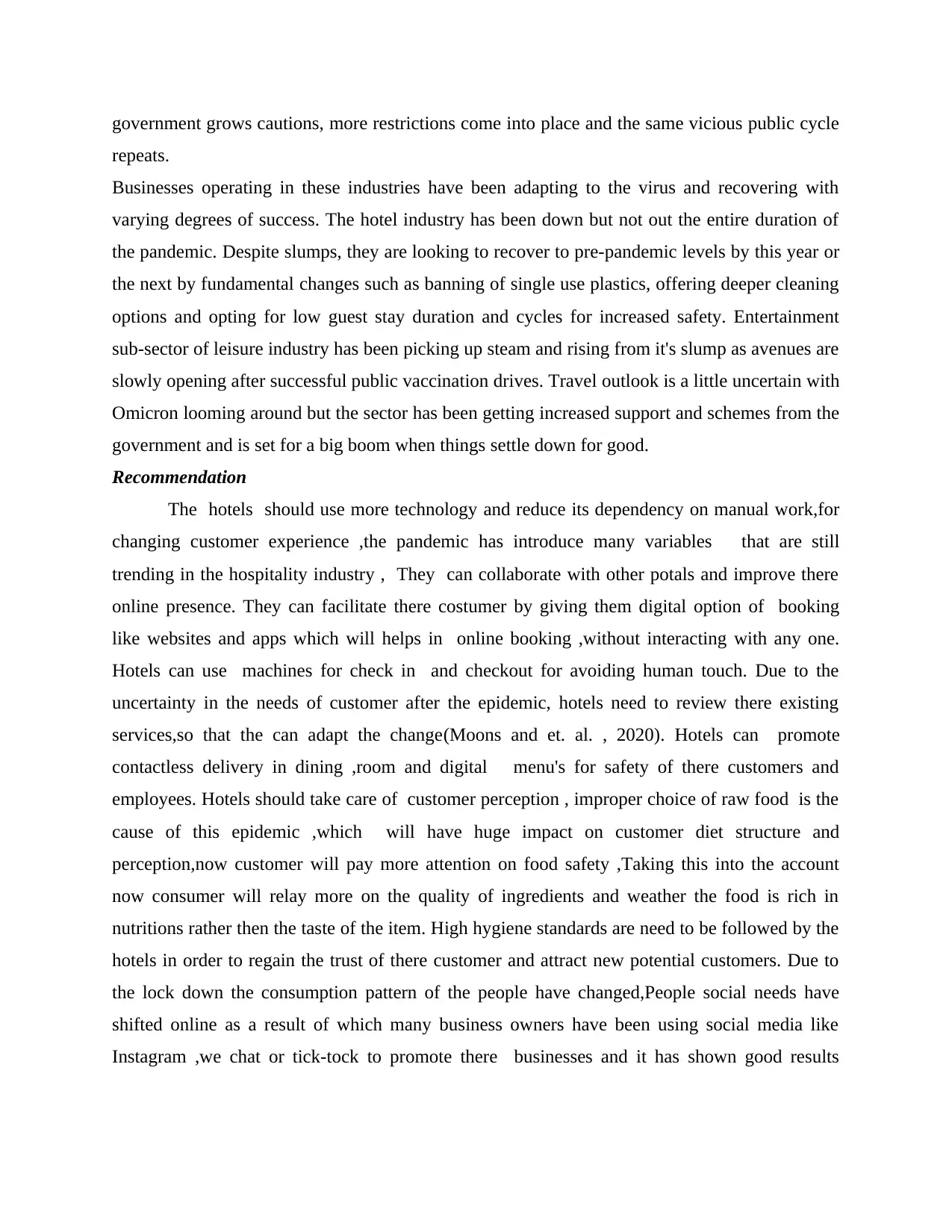
government grows cautions, more restrictions come into place and the same vicious public cycle
repeats.
Businesses operating in these industries have been adapting to the virus and recovering with
varying degrees of success. The hotel industry has been down but not out the entire duration of
the pandemic. Despite slumps, they are looking to recover to pre-pandemic levels by this year or
the next by fundamental changes such as banning of single use plastics, offering deeper cleaning
options and opting for low guest stay duration and cycles for increased safety. Entertainment
sub-sector of leisure industry has been picking up steam and rising from it's slump as avenues are
slowly opening after successful public vaccination drives. Travel outlook is a little uncertain with
Omicron looming around but the sector has been getting increased support and schemes from the
government and is set for a big boom when things settle down for good.
Recommendation
The hotels should use more technology and reduce its dependency on manual work,for
changing customer experience ,the pandemic has introduce many variables that are still
trending in the hospitality industry , They can collaborate with other potals and improve there
online presence. They can facilitate there costumer by giving them digital option of booking
like websites and apps which will helps in online booking ,without interacting with any one.
Hotels can use machines for check in and checkout for avoiding human touch. Due to the
uncertainty in the needs of customer after the epidemic, hotels need to review there existing
services,so that the can adapt the change(Moons and et. al. , 2020). Hotels can promote
contactless delivery in dining ,room and digital menu's for safety of there customers and
employees. Hotels should take care of customer perception , improper choice of raw food is the
cause of this epidemic ,which will have huge impact on customer diet structure and
perception,now customer will pay more attention on food safety ,Taking this into the account
now consumer will relay more on the quality of ingredients and weather the food is rich in
nutritions rather then the taste of the item. High hygiene standards are need to be followed by the
hotels in order to regain the trust of there customer and attract new potential customers. Due to
the lock down the consumption pattern of the people have changed,People social needs have
shifted online as a result of which many business owners have been using social media like
Instagram ,we chat or tick-tock to promote there businesses and it has shown good results
repeats.
Businesses operating in these industries have been adapting to the virus and recovering with
varying degrees of success. The hotel industry has been down but not out the entire duration of
the pandemic. Despite slumps, they are looking to recover to pre-pandemic levels by this year or
the next by fundamental changes such as banning of single use plastics, offering deeper cleaning
options and opting for low guest stay duration and cycles for increased safety. Entertainment
sub-sector of leisure industry has been picking up steam and rising from it's slump as avenues are
slowly opening after successful public vaccination drives. Travel outlook is a little uncertain with
Omicron looming around but the sector has been getting increased support and schemes from the
government and is set for a big boom when things settle down for good.
Recommendation
The hotels should use more technology and reduce its dependency on manual work,for
changing customer experience ,the pandemic has introduce many variables that are still
trending in the hospitality industry , They can collaborate with other potals and improve there
online presence. They can facilitate there costumer by giving them digital option of booking
like websites and apps which will helps in online booking ,without interacting with any one.
Hotels can use machines for check in and checkout for avoiding human touch. Due to the
uncertainty in the needs of customer after the epidemic, hotels need to review there existing
services,so that the can adapt the change(Moons and et. al. , 2020). Hotels can promote
contactless delivery in dining ,room and digital menu's for safety of there customers and
employees. Hotels should take care of customer perception , improper choice of raw food is the
cause of this epidemic ,which will have huge impact on customer diet structure and
perception,now customer will pay more attention on food safety ,Taking this into the account
now consumer will relay more on the quality of ingredients and weather the food is rich in
nutritions rather then the taste of the item. High hygiene standards are need to be followed by the
hotels in order to regain the trust of there customer and attract new potential customers. Due to
the lock down the consumption pattern of the people have changed,People social needs have
shifted online as a result of which many business owners have been using social media like
Instagram ,we chat or tick-tock to promote there businesses and it has shown good results
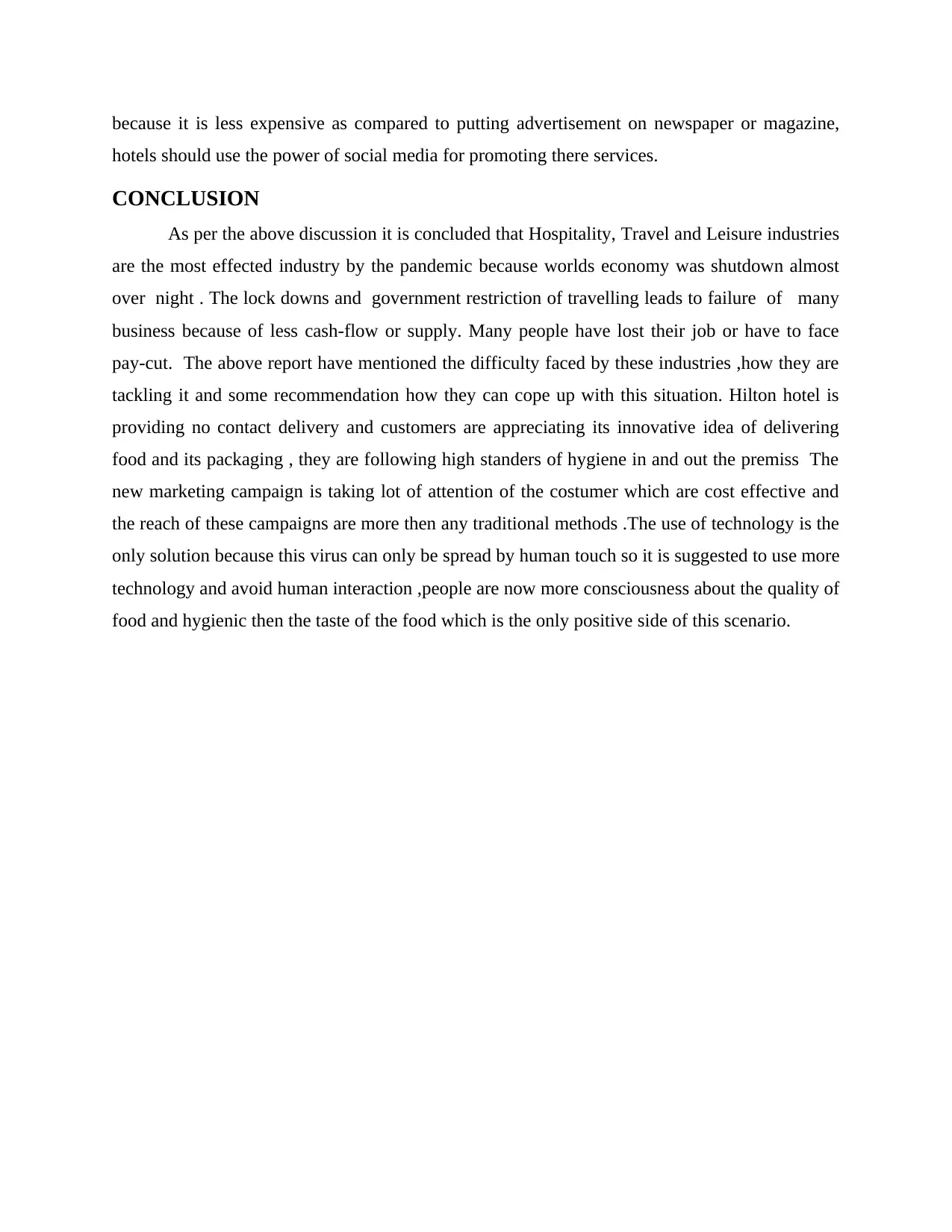
because it is less expensive as compared to putting advertisement on newspaper or magazine,
hotels should use the power of social media for promoting there services.
CONCLUSION
As per the above discussion it is concluded that Hospitality, Travel and Leisure industries
are the most effected industry by the pandemic because worlds economy was shutdown almost
over night . The lock downs and government restriction of travelling leads to failure of many
business because of less cash-flow or supply. Many people have lost their job or have to face
pay-cut. The above report have mentioned the difficulty faced by these industries ,how they are
tackling it and some recommendation how they can cope up with this situation. Hilton hotel is
providing no contact delivery and customers are appreciating its innovative idea of delivering
food and its packaging , they are following high standers of hygiene in and out the premiss The
new marketing campaign is taking lot of attention of the costumer which are cost effective and
the reach of these campaigns are more then any traditional methods .The use of technology is the
only solution because this virus can only be spread by human touch so it is suggested to use more
technology and avoid human interaction ,people are now more consciousness about the quality of
food and hygienic then the taste of the food which is the only positive side of this scenario.
hotels should use the power of social media for promoting there services.
CONCLUSION
As per the above discussion it is concluded that Hospitality, Travel and Leisure industries
are the most effected industry by the pandemic because worlds economy was shutdown almost
over night . The lock downs and government restriction of travelling leads to failure of many
business because of less cash-flow or supply. Many people have lost their job or have to face
pay-cut. The above report have mentioned the difficulty faced by these industries ,how they are
tackling it and some recommendation how they can cope up with this situation. Hilton hotel is
providing no contact delivery and customers are appreciating its innovative idea of delivering
food and its packaging , they are following high standers of hygiene in and out the premiss The
new marketing campaign is taking lot of attention of the costumer which are cost effective and
the reach of these campaigns are more then any traditional methods .The use of technology is the
only solution because this virus can only be spread by human touch so it is suggested to use more
technology and avoid human interaction ,people are now more consciousness about the quality of
food and hygienic then the taste of the food which is the only positive side of this scenario.
⊘ This is a preview!⊘
Do you want full access?
Subscribe today to unlock all pages.

Trusted by 1+ million students worldwide
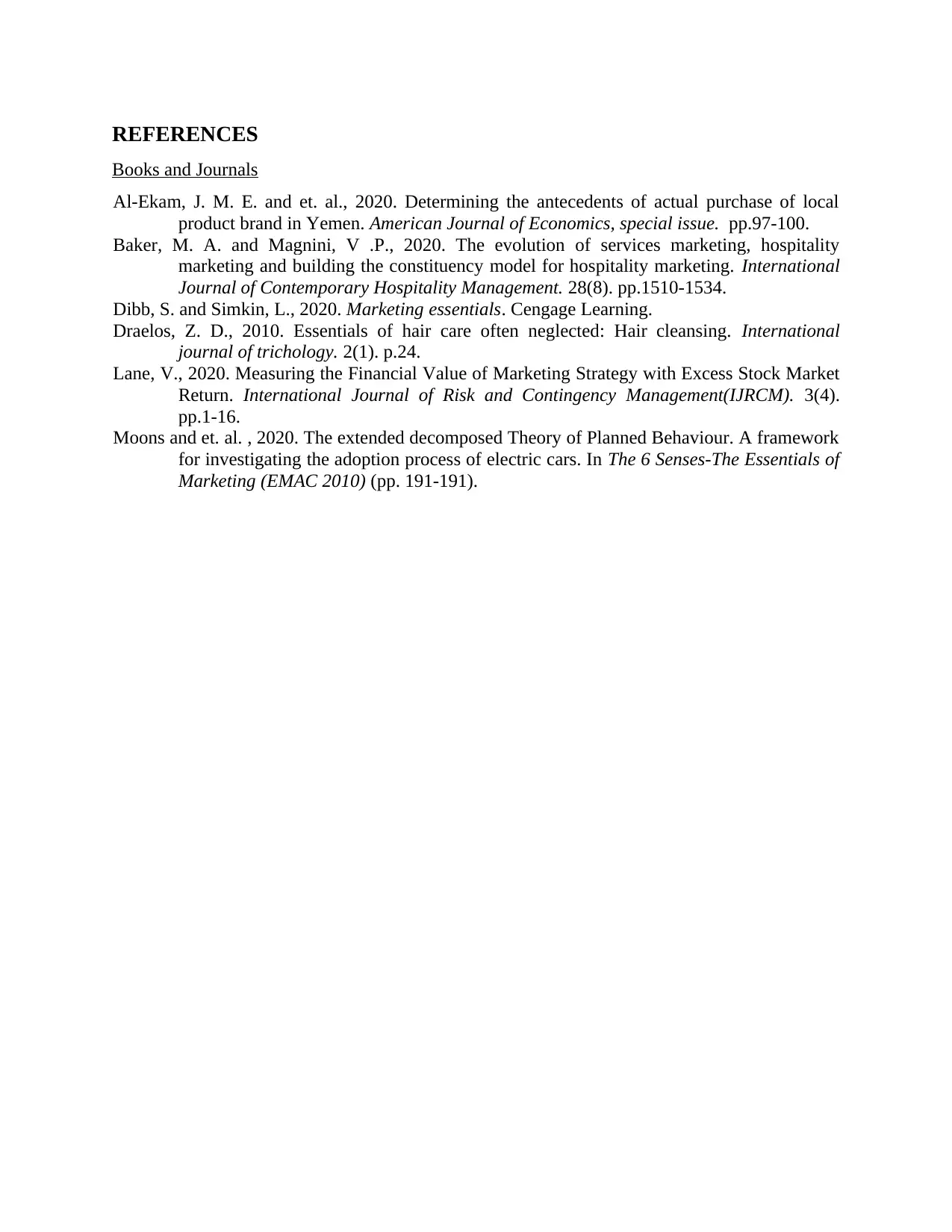
REFERENCES
Books and Journals
Al-Ekam, J. M. E. and et. al., 2020. Determining the antecedents of actual purchase of local
product brand in Yemen. American Journal of Economics, special issue. pp.97-100.
Baker, M. A. and Magnini, V .P., 2020. The evolution of services marketing, hospitality
marketing and building the constituency model for hospitality marketing. International
Journal of Contemporary Hospitality Management. 28(8). pp.1510-1534.
Dibb, S. and Simkin, L., 2020. Marketing essentials. Cengage Learning.
Draelos, Z. D., 2010. Essentials of hair care often neglected: Hair cleansing. International
journal of trichology. 2(1). p.24.
Lane, V., 2020. Measuring the Financial Value of Marketing Strategy with Excess Stock Market
Return. International Journal of Risk and Contingency Management(IJRCM). 3(4).
pp.1-16.
Moons and et. al. , 2020. The extended decomposed Theory of Planned Behaviour. A framework
for investigating the adoption process of electric cars. In The 6 Senses-The Essentials of
Marketing (EMAC 2010) (pp. 191-191).
Books and Journals
Al-Ekam, J. M. E. and et. al., 2020. Determining the antecedents of actual purchase of local
product brand in Yemen. American Journal of Economics, special issue. pp.97-100.
Baker, M. A. and Magnini, V .P., 2020. The evolution of services marketing, hospitality
marketing and building the constituency model for hospitality marketing. International
Journal of Contemporary Hospitality Management. 28(8). pp.1510-1534.
Dibb, S. and Simkin, L., 2020. Marketing essentials. Cengage Learning.
Draelos, Z. D., 2010. Essentials of hair care often neglected: Hair cleansing. International
journal of trichology. 2(1). p.24.
Lane, V., 2020. Measuring the Financial Value of Marketing Strategy with Excess Stock Market
Return. International Journal of Risk and Contingency Management(IJRCM). 3(4).
pp.1-16.
Moons and et. al. , 2020. The extended decomposed Theory of Planned Behaviour. A framework
for investigating the adoption process of electric cars. In The 6 Senses-The Essentials of
Marketing (EMAC 2010) (pp. 191-191).
1 out of 7
Related Documents
Your All-in-One AI-Powered Toolkit for Academic Success.
+13062052269
info@desklib.com
Available 24*7 on WhatsApp / Email
![[object Object]](/_next/static/media/star-bottom.7253800d.svg)
Unlock your academic potential
Copyright © 2020–2026 A2Z Services. All Rights Reserved. Developed and managed by ZUCOL.




